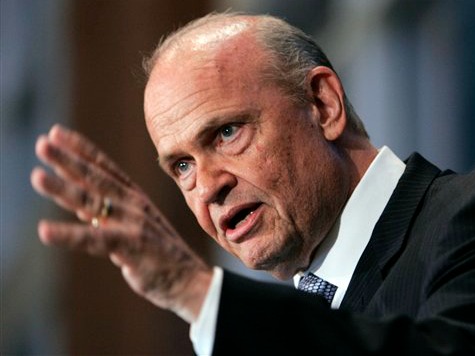
NATIONAL HARBOR, MD –Former Sen. Fred Thompson says Americans are more open than ever to stories in which the government does some rather awful things. Consider the cultural appetite for binge viewing favorite House of Cards.
That may give Hollywood creative wiggle room, but it doesn’t speak well of our faith in public institutions.
“The cynicism and skepticism [toward government] we have now is unprecedented,” Thompson says of the Age of Obama. That leaves those who watch House of Cards or his next movie thinking, “so that’s the way it is.”
The TN Republican and Die Hard 2 alum worked Thursday’s CPAC event on behalf of Persecuted, a film slated for a May 9 release on roughly 600 screens. The movie, set to screen Friday at the conservative conference, follows an Evangelical man (James Remar, Django Unchained) framed for murder. Now, Remar’s character must clear his name while exposing the forces eager to clamp down on two of the country’s most essential freedoms–religion and speech.
Thompson said Persecuted is far from a “run of the mill movie,” one reason the actor committed to the project. Besides, a film in which the First Amendment stands in harm’s way makes it a “pretty timely” tale.
Writer/director Daniel Lusko is glad current events have veered directly into the path of his film, even though he started writing Persecuted five years ago. In the intervening years the project went through a series of both political and religious examinations, a process he appears at ease with despite the time lag.
Lusko resisted putting party labels on the key characters in the film and hopes it can unite the left and the right on matters like freedom of speech. Still, he understands why the subject matter will appeal to Red State audiences. Ultimately, he just wants to craft a compelling political thriller.
Persecuted may be Lusko’s first feature-length film, but Thompson’s Hollywood career goes back into the 1980s. At that time, foreign ticket sales mattered little to studio bean counters. No more. Thompson fears how our obedience to foreign film markets–and Chinese censors–impacts the movies we see.
Tomorrow’s Hollywood product might focus less on every day citizens and more on what the industry thinks will resonate abroad–think anti-American memes, for example.
He understands why screenwriters might delight in creating twisted F.B.I. or C.I.A. characters, or even corporate types who give our hero fits. Taken cumulatively, they paint a bleak portrait of America, one that might leave a mark on audiences both here and abroad.
Still, Thompson is encouraged to see technological breakthroughs that allow more filmmakers to join the creative process. It’s why we could see a broader palette of subjects in the coming years, something the former politician heartily endorses.

COMMENTS
Please let us know if you're having issues with commenting.